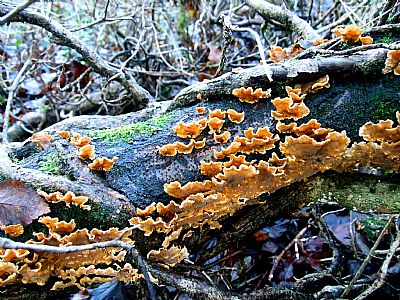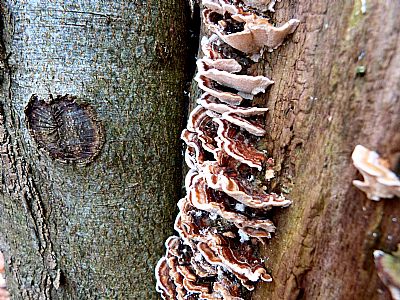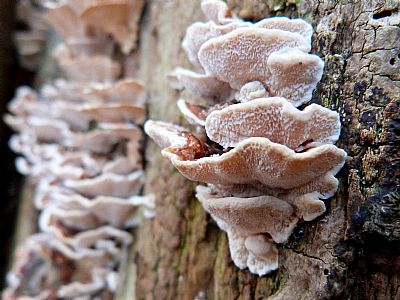STEREUM HIRSUTUM FUNGUS
Usually referred to by its botanical namel, but also called Hairy Curtain Crust or false turkey tail.
We need some caution with identification here.
The firm identification here needs to be taken with caution (Check with an expert). As the FirstNature website says, No matter how many of these attractve bracket fungi you see, there will always be another Stereum hirsutum with significantly different coloration. The variability of this fungus makes its identification at first rather difficult.
Stereum hirsutum is common and widespread throughout Britain and Ireland. On mainland Europe this crust fungus is found from Scandinavia right down to the Mediterranean region.
That website goes on to say : Stereum, the generic name, means tough, and crust fungi in this genus certainly can be difficult to tear when you want to take a small sample for investigation. The specific epithet hirsutum means hairy (hirsute, indeed!), and the upper surfaces of these irregularly-shaped tiered brackets are distinctly hairy when the fruitbodies are young and fresh; however, they do become smoother with age.
The common name Hairy Curtain Crust reflects (in the 'curtain' part) the rippled form of edges of the fruitbodies, which do look like partly-drawn curtains; however, it's very much more common to see this species growing in the form of tiers of reflexed crusts or brackets, particularly on standing dead wood, than as resupinate crusts (although the latter form does occur, and I see this most often on the ends and vertical faces of stacked sawn timber).

This example was found in Craig Andro Woods below the Hundred Steps on the way to Carman Muir.

This example covering much of a dying tree trunk, was found in Fishers Wood in January.

And this is a close up of the same tree.
As noted above, it is difficult to confirm the identity of this fungus. Elsewhere we warn of the dangers of misidentity of fungus and mushrooms. However Turkey Tail fungus has some remarkable qualities beneficial to us. The Spores Shore website tells more.
Among its many benefits, Turkey Tail's impact on the immune system stands out prominently. Research suggests that extracts from Turkey Tail can activate our white blood cells, bolstering our defences against infectious ailments. This immune-boosting quality has profound implications for overall health and well-being.
Moreover, turkey tail mushroom contains prebiotic fibers that promote the growth of beneficial gut bacteria, known as probiotics. A healthy gut microbiome is essential for a robust immune response, as it plays a crucial role in training the immune system and regulating inflammation. By nurturing a balanced and diverse microbiota, turkey tail mushroom indirectly supports immune health and resilience against infections.
SPORES SHORE website: https://sporeshore.co.uk/blogs/blog/unveiling-the-wonders-of-turkey-tail-mushroom-a-comprehensive-guide

